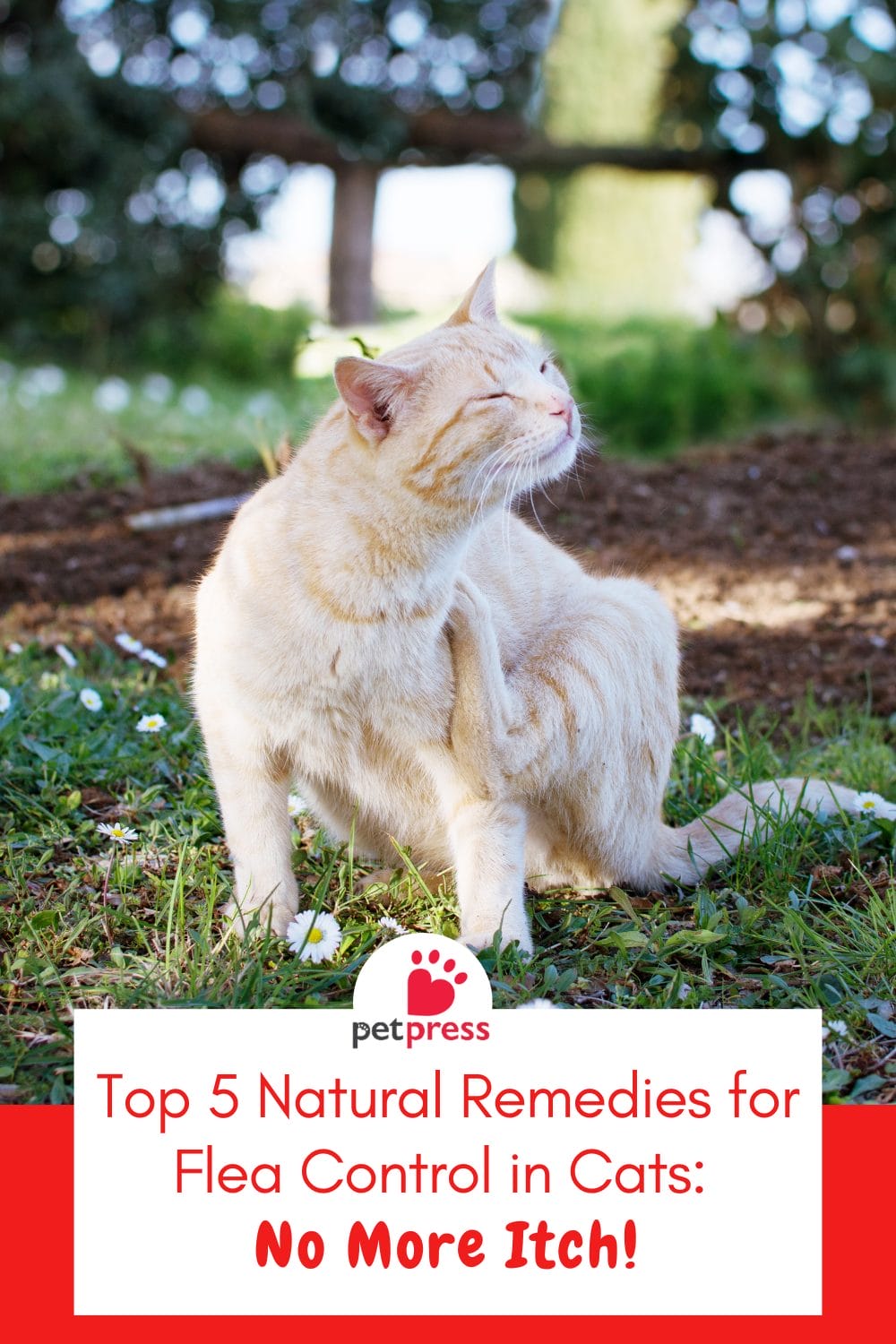
Fleas are the bane of any cat’s existence. These pesky critters can make your feline friend itchy and miserable. To tackle this, pet parents often turn to chemical treatments. However, natural remedies for flea control in cats provide a gentler approach. Not only can they soothe your cat’s discomfort, but they also keep those tiny jumpers at bay.
In our quest for a happy, healthy kitty, why not choose a path that’s kind to their skin and our planet? Moving away from harsh chemicals, let’s explore some earth-friendly, natural remedies that promise a scratch-free life for your cat. Safe and effective, these remedies might just be the relief your whiskered companion needs.
Understanding Fleas and Your Feline Friend
Fleas are tiny, yet they cause huge issues for cats. A single flea can multiply rapidly, making your cat’s life uncomfortable. Here’s why understanding the flea life cycle is key to keeping your cat itch-free.
The Flea Life Cycle:
- Eggs: These are laid on your cat and fall off into the environment.
- Larvae: They hatch from eggs and hide in carpets or bedding.
- Pupae: They cocoon themselves before becoming adult fleas.
- Adults: They hop onto your cat, the final host, where they feed and lay eggs.
This cycle can go on and on, making your cat scratch endlessly. Now, let’s recognize the red flags of a flea problem.
Signs of Flea Infestations:
- Excessive Scratching: Watch for your cat itching more than usual.
- Flea Dirt: These look like tiny black specks in your cat’s fur.
- Hair Loss: Constant scratching can lead to noticeable bald patches.
Spotting these signs early is crucial. It means you can start those natural flea treatments before your cuddly cat becomes miserable.
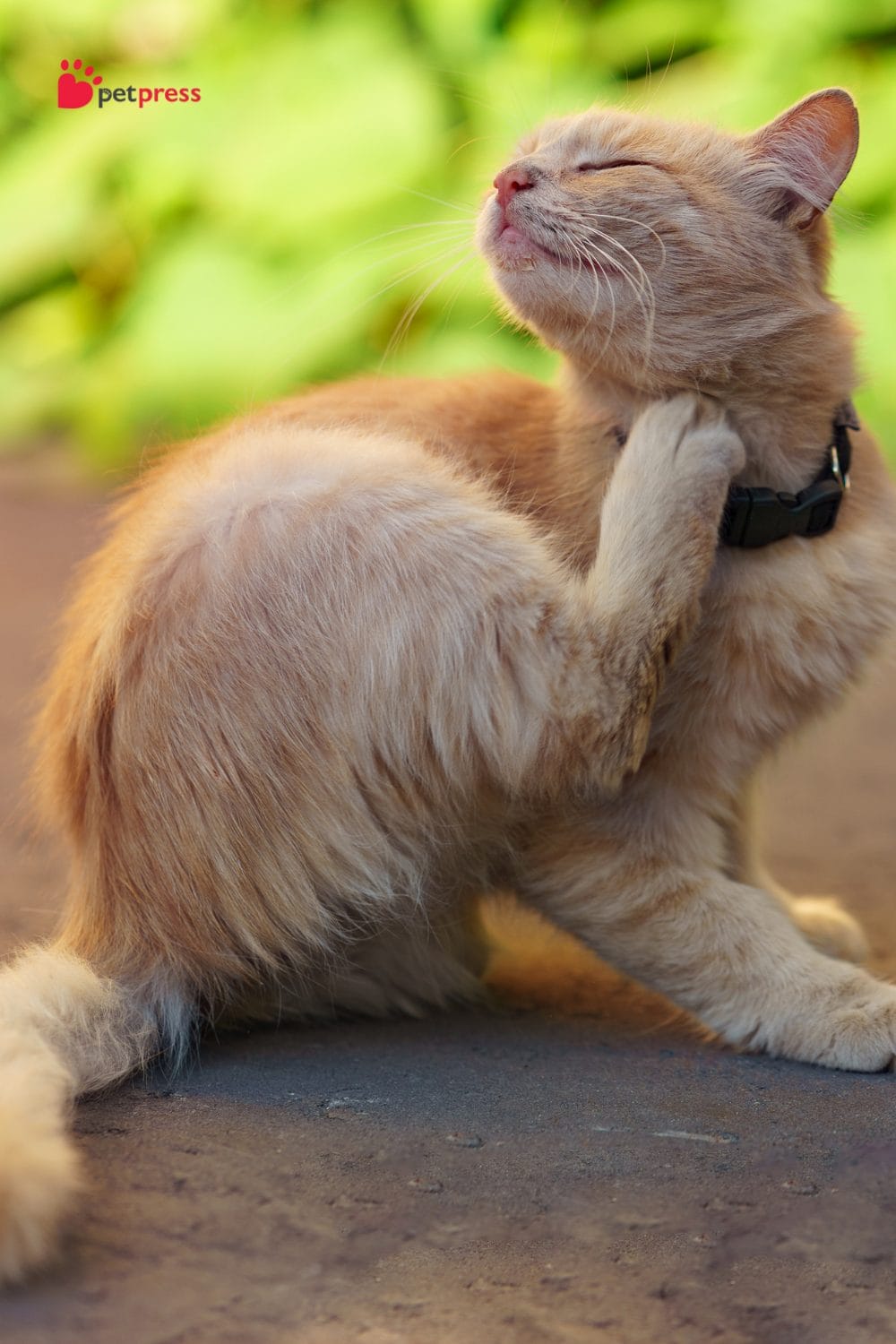
The Appeal of Natural Solutions
Natural solutions offer a gentle touch for your cat’s flea woes. These remedies are derived from Mother Nature, promising a kinder way to keep your cat itch-free and happy. Plus, they fit perfectly into an eco-conscious lifestyle, keeping the environment as healthy as your pet.
Benefits of Natural Remedies for Flea Control in Cats
- Gentle on Skin: Unlike some harsh chemicals, natural options are softer on your cat’s sensitive skin.
- Eco-Friendly: Natural flea treatments are better for the planet, reducing the chemical load in our homes and yards.
- Peace of Mind: Knowing what’s in your cat’s flea remedy means you can relax about their health and safety.
Risks Associated with Chemical Flea Treatments
Chemical flea treatments can be tough on your cat and the environment. There’s always a risk of skin irritation or more severe allergic reactions.
Over time, these potent formulas can also build up in your cat’s system, leading to potential health concerns that no pet parent wants to face. Moreover, the runoff from these treatments can harm local wildlife and water sources, adding a bigger environmental cost to the mix.
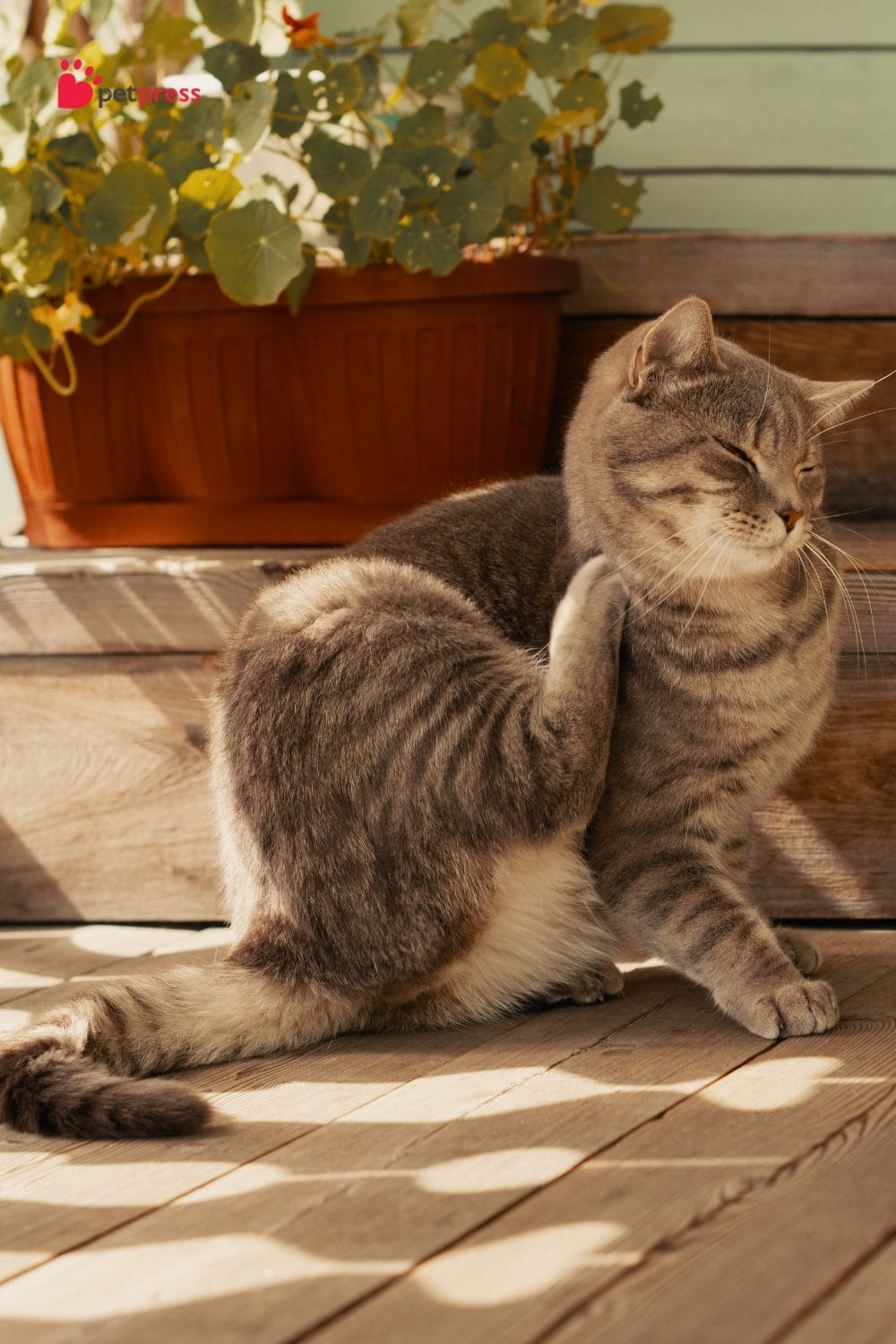
Top Natural Remedies for Flea Control in Cats
1. Herbal Flea Collars
Herbal flea collars are a natural shield against those pesky parasites. They’re infused with safe, flea-repelling herbs and essential oils. These collars can be a non-toxic way to keep your kitty protected.
Here’s a simple DIY option to create your cat’s flea-repellent collar at home:
- Start with a soft cloth or pet-friendly material collar as the base.
- Select natural flea-repelling essential oils like lavender, cedarwood, or lemongrass.
- Dilute a few drops of your chosen essential oils with a carrier oil, such as almond oil, to ensure it’s gentle on your cat’s skin.
Remember, cats are more sensitive to essential oils than dogs, so it’s crucial to use only cat-safe oils and in small amounts. Always consult with your vet before trying new treatments.
Once the collar is ready, ensure it’s loose enough for comfort but tight enough to stay on. Replace the collar every month for the best natural flea control. Your cat will be thanking you with purrs and cuddles, flea-free and happy!
2. Essential Oils: Nature’s Repellent
Imagine a flea-free life for your cat using the fragrant power of nature. Essential oils are great allies in the fight against fleas. When used correctly, they work wonders.
Safely Using Essential Oils as Flea Deterrents
- Dilute, Dilute, Dilute: Never apply pure essential oils to your cat’s coat. Always dilute with a carrier oil.
- A Patch Test Is Key: Apply a small amount to check for reactions before a full application.
- Consult Professionals: Your vet can provide advice on safe application methods.
Warning About Oils That Are Toxic to Cats
Not all oils are cat-friendly. In fact, some can be downright dangerous. Here’s what to steer clear of:
- Eucalyptus: It’s a no-go. Eucalyptus oil can lead to severe health issues in cats.
- Tea Tree Oil: Even small amounts are toxic to your furry friend.
- Citrus Oils: They are natural flea repellents but can be harmful to cats if not used properly.
Before incorporating essential oils into your flea control plan, do thorough research and talk to your vet. It’s all about keeping your purring pal safe and comfortable.
3. The Magic of Diatomaceous Earth
Diatomaceous earth might sound like magic dust, and for cat owners battling fleas, it just might be. It’s a natural, non-toxic powder made from crushed fossils of freshwater organisms and marine life.
How to Use Food-Grade Diatomaceous Earth for Flea Control:
- Identify the areas where your cat spends most of its time. These are your target spots for diatomaceous earth.
- Sprinkle a light layer of food-grade diatomaceous earth on your cat’s bedding and favorite lounging spots.
- Use a brush or hand to gently work the powder into carpets, cracks, and baseboards.
- Remember to apply it to the cat’s litter box area too, as fleas often hide in these spaces.
Repeat the application process once a week for a couple of weeks to ensure you tackle any new fleas that may hatch. It’s a simple, natural flea remedy that promises a more comfortable, itch-free life for your furry friend.
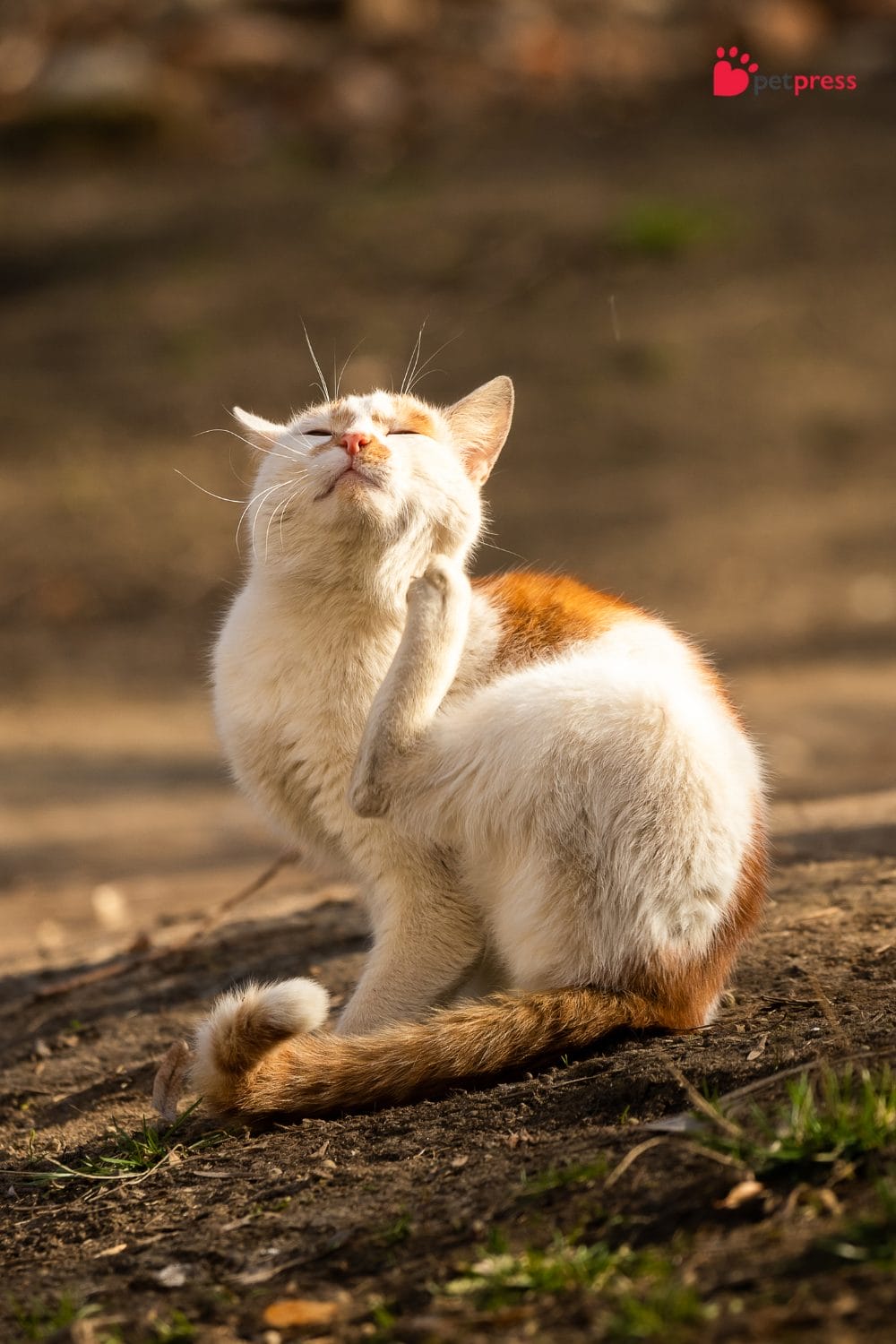
4. Nourish to Repel: Supplements for Flea Control
Believe it or not, what your cat eats can affect their appeal to fleas. A robust diet strengthens your cat’s natural defenses. Here’s how you can tweak mealtime to keep those fleas at bay:
- Boost with B Vitamins: Adding a B-complex vitamin to your cat’s diet can make them less tasty to fleas. Fleas dislike the smell and taste it produces in your cat’s skin.
- Essential Fatty Acids: Omega-3 and Omega-6 supplements not only support skin health but also deter fleas. A shiny coat and flea-free life? That’s a win-win!
- Garlic’s Gentle Touch: A tiny dose of garlic can act as a natural flea repellent. But be cautious; too much can be harmful.
- Apple Cider Vinegar: A splash in their water makes your cat’s skin more acidic, repelling fleas. Always dilute it well and consult your vet first.
Remember, these supplements are not instant fixes but part of a long-term strategy for flea control. Always talk to your vet before introducing new supplements into your cat’s diet. Together, you can create a fortress against fleas from the inside out!
5. Regular Grooming: Your First Defense Against Fleas
Regular grooming is your front-line warrior in the battle against fleas. A good brush-out can catch fleas before they settle in.
- Combing: Start with a flea comb, an essential tool in your cat’s grooming kit. Flea combs have fine teeth that snag fleas and their eggs. Use it daily for best results.
- Bathing: While cats typically aren’t fans of water, a mild, natural flea-repellent shampoo can do wonders. Choose cat-friendly options and bathe sparingly to not dry out their skin.
- Frequent checks during grooming can alert you to flea issues early. Plus, this bonding time can be soothing for you and your cat.
- Spot Checks: Keep an eye out for red skin or flea dirt. These are telltale signs that fleas might be making a home in your cat’s fur.
Remember, while grooming is a key defense, it’s also a special moment between you and your cat. It’s care, love, and protection—all in one.
Consult Your Vet: Expert Advice for Flea Troubles
Even the best natural remedies for flea control in cats may require a vet’s touch. Sometimes, despite our efforts, fleas persist. That’s when it’s vet time.
- When Fleas Overrun: If your kitty’s flea problem doesn’t improve, consult your vet. They offer targeted solutions.
- Allergic Reactions: Flea allergies in cats aren’t rare. A vet can diagnose this and suggest remedies.
- For Kittens: Little ones need gentler care. Seek a vet’s advice before any flea treatment.
- Overall Health: A healthy cat is a happy cat. Regular vet visits can prevent flea infestations.
A chat with your vet ensures your four-legged friend gets the best care, specific to their needs. Your cat’s unique health profile deserves a tailored approach, one that only a professional can provide. Don’t hesitate to reach out for guidance or to confirm that your natural flea control method is fit for your feline.
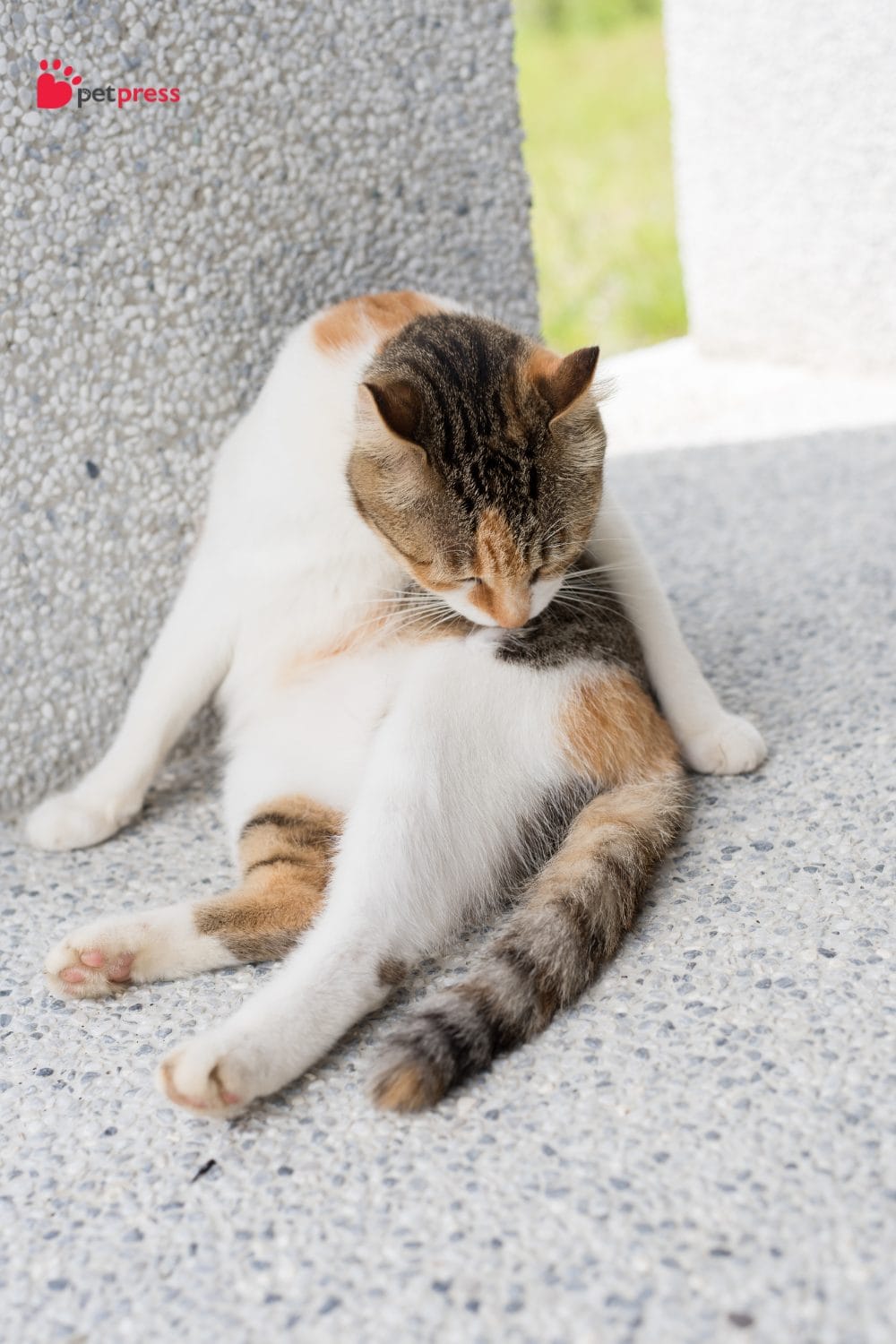
Conclusion
Natural remedies for flea control in cats offer a kinder touch for our furry friends. They’re packed with benefits, minus the harsh side effects of chemicals. With these organic options, your cat can enjoy a flea-free life while staying as healthy and happy as ever.
Embracing these safe and natural methods means choosing a path that’s gentle on your cat’s skin and overall well-being. Simple ingredients from nature can be powerful allies in the fight against fleas. They work effectively without the worry of harsh chemicals in your home environment.
We encourage you to try these natural flea treatments for cats. Not only will they provide relief, but they’ll also keep your kitty safe from toxins. It’s a caring step towards a healthier home for both you and your four-legged companion.
Consider the comfort and safety that natural flea remedies bring to your feline’s life. They’re worth exploring for any pet owner who values a non-toxic approach to pet care. Your cat deserves the gentle touch of nature in their battle against pesky fleas.
FAQs About Natural Remedies for Flea Control in Cats
The best natural flea treatments include diatomaceous earth, flea-repelling plants, and regular grooming with a flea comb.
Natural remedies often require more frequent application than chemicals. Check weekly for fleas and treat as needed.
Yes, bathing can help remove fleas, but ensure you use a natural, cat-safe shampoo and not over-bathe, which can dry out their skin.
Frequent vacuuming, washing pet bedding in hot water, and using natural sprays with essential oils can keep your home flea-free.
Some natural remedies are safe for kittens, but their delicate systems are sensitive, so always consult with a vet beforehand.
- Does Cat Litter Melt Ice? The Complete Guide to Winter Safety - January 30, 2026
- Happy Tail Dogs: Understanding This Common Canine Condition - January 29, 2026
- How Cold Can Outdoor Cats Handle? Feline Winter Safety - January 27, 2026


GIPHY App Key not set. Please check settings